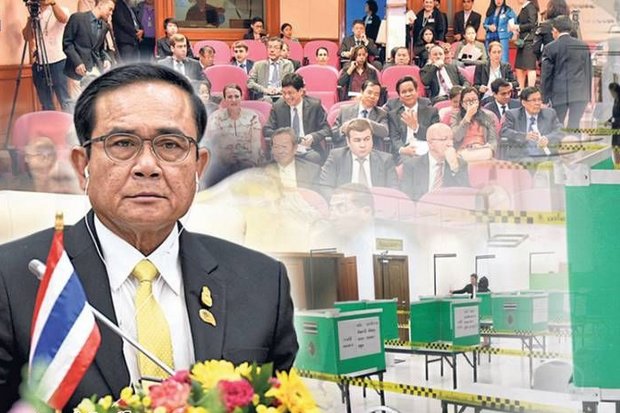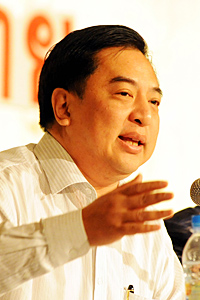
The latest proposal by Somchai Sawaengkarn, a member of the coup-installed National Legislative Assembly (NLA), asking for a consensus from political parties for a further delay of the general election of another three months has been seen as a regime tactic to extend its grip on power. Such a proposal deserves to be condemned.
This coming May, the National Council for Peace and Order (NCPO) will mark its fourth year in charge since the coup d'etat of 2014. The NCPO and the mechanisms it set up to maintain power, the so-called "Five Rivers", have already overstayed their public welcome, even among the coup supporters. The longer they procrastinate, the more they damage the nation, politically and economically, and pave the way for their own downfall.
The regime, led by Prime Minister Gen Prayut Chan-o-cha, may claim that it has brought stability after a decade of political turmoil under colour-coded divisiveness which at times resulted in violence, deaths and injuries. But the calm on the surface is an illusion as the undercurrents remain fierce and forceful.

Suranand Vejjajiva was secretary-general to the prime minister during the Yingluck Shinawatra government and is now a political analyst.
From an economic perspective, political stability seems to benefit big business allies of the regime, such as the main players of state projects, ranging from the community-based "Pracharat" programmes to the Eastern Economic Corridor (EEC). While economic growth is sustained by the vibrant tourism and hospitality industry and mega-infrastructure projects the regime is able to accelerate without the usual political haggling required by a democratic administration. Yet, trade remains restricted due to political constraints. We will not see full foreign trade relations return until an elected government is in place. The lost opportunities of the past four years are immeasurable.
It is the smaller-sized enterprises which have taken the full brunt of this skewed economic growth. Street vendors are crowded out by convenience stores which can afford to keep food prices low. Independent enterprises cannot break out due to the dominance of corporations in marketing channels. Social media helps, of course, but a breakthrough is harder without a knowledge base for innovation, an area where large corporations hold all the leverage.
The pull factor of large corporations and government investments is not enough. It is the multiplier effect of the circulating cash of the small- and medium-sized enterprises that turns an economy. Unless they have the opportunity to grow and accumulate income, overall stagnation will remain. Reduced economic opportunities also impacts on the tax base leading to fiscal difficulties and increasing deficits.
"Gen Prayut does not have to pay for his own food," a taxi driver told me. "He has lost touch with the people."
It is true that under an elected system politicians may cater to large business interests. But they must listen to smaller entities too. Votes do matter and, in the hope of being elected, or re-elected, politicians cannot forget those who walk the streets.
With the help of the "Five Rivers", the regime is getting too comfortable. Without a mechanism of checks and balances, lawmakers issue laws that arguably favour special interest groups. Disagreements are not about protecting the public interest but how to maintain power and sustain the regime.
Such comfort can lead to arrogance, as in the case of DPM Gen Prawit Wongsuwon's undeclared luxury watches, with questions of double standards being raised on the part of the National Counter Corruption Commission (NCCC), who also dealt with then PM Yingluck Shinawatra's undeclared watch.
Or take the hunting case involving Premchai Karnasuta which raises questions about the rule of law when applied to the rich and powerful. The tycoon is the owner of one of the country's largest contractors. If he was a mere local shooting wild rabbits, he might have been thrown in jail.
It is dangerous when the arrogance starts to permeate the organisational culture of the state. The "stupidity" letter, issued by a local administrative agency echoes that sad fact.
When people stay in power for too long, they begin to believe that they are indispensable. Without them, they may think, the country would be in trouble and in a crisis. At the same time, they have to preserve the status quo, help out friends and make money from those services through their "commission", which is corruption. Under such circumstances, it becomes harder and harder to let go. They cannot now get off the tiger's back without being eaten alive.
This phenomenon is not unique to authoritarian governments but also occurs in democratically elected ones. Both try to use all means possible to extend their stay. However, in a democracy, politicians have to go back to the voters, while authoritarian rulers end up using force to maintain power.
That is why the regime is procrastinating. Although it feels the pressure to return to some form of democracy, it only wants an election as a façade to claim political legitimacy. But even under a manipulated arrangement, the regime is afraid they could lose an election and thus be pushed out of power. With the outcome still uncertain, they are devising different kinds of fail safe mechanisms, including attempts to set up a political party and woo others for support.
The regime needs more time to ensure it can maintain its grasp on power. Its latest delaying tactic is through the organic laws. Prime Minister Prayut claims he has nothing to do with the process, but he is losing credibility and could face the music sooner than he thinks.
In reality, Gen Prayut can change the roadmap instantly, with his Section 44 powers, forcing the "Five Rivers" to strictly follow the process. He can actually set a date for an election.
Gen Prayut should be reminded that democratic process provides for a graceful exit for politicians. For those who cling on to power, it is only a matter of time until the final straw breaks the camel's back, and likely ends in a disgraceful downfall.
